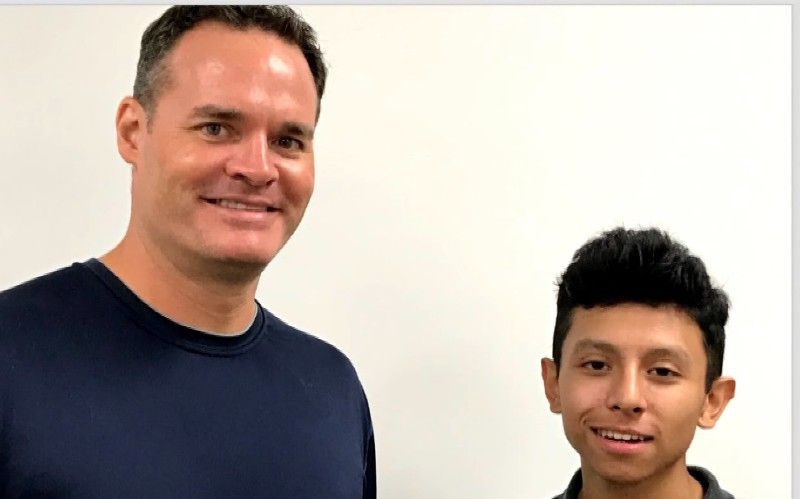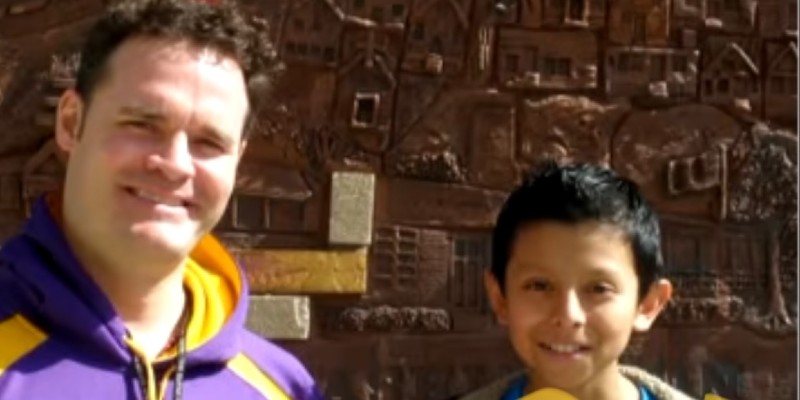I began mentoring through the CU One-to-One Mentoring Program in the spring of 2017. I matched with a 3rd grade student. The first day I met J, she flung her arms around me and gave me a giant bear hug. That moment pretty well defined our mentoring relationship. She was all in from the start. We met at lunchtime once a week and played games, did some crafts, and spent time on the playground. As she moved into middle school, we went all in on the crafts and our conversations deepened. We spent an entire school year meeting over Zoom. She’s moved out of the school district, so we no longer meet, but I will always be a person she can text if she needs to chat.
My new mentee, S, was a little unsure at first, but after a few visits we’ve found a rhythm, and I’m looking forward to seeing how our relationship develops.
Brian Oviedo was matched with his mentor, Ryan Perry, when he was a student at Booker T. Washington. “We would go to the mentor room and play Uno and card games, or hang out in the cafeteria…there were always snacks.” Once he got to high school, he realized how important it was to have a mentor as part of his support system. “When I started to prepare for the SATs and college, it was an intimidating process as a first generation student.” He says Perry helped him advocate for himself, find answers to his questions, and connect him with people who could assist him in the process.
Students who remain in the mentoring program through high school graduation can receive scholarship money to go towards continuing their education. Oviedo is now a junior studying marketing at the University of Illinois, and the benefit of his time in the mentoring program goes beyond having some money to help with college. He credits Perry with helping him overcome self doubt. “I was always one of two Latinos in the accelerated and AP classes. It felt like I almost didn’t belong. He was always there to make sure that I was in that growth mindset.” Oviedo still applies that growth mindset in his endeavors at school and beyond. Last summer he interned with Chewy, and will be interning with Google this summer.
If you are interested in becoming a mentor, you start by filling out an application and sending it to the appropriate district coordinator. That’s Lauren Smith in Unit 4, and Mia Lavizzo in District 116. After an initial interview, you’ll complete a background check and be asked to attend a two hour training. Then, depending on the age of student you’d like to mentor, you’ll be connected with a mentor coordinator at one of the schools. Students can enter the mentoring program beginning in third grade, though some may be identified as possible mentees in middle school or high school.
After meeting with your mentor coordinator, they will match you with a student based on your interview, and conversations they’ve had with potential mentees. I spoke with Michelle Takehara, my mentor coordinator at International Prep Academy, to find out more about how she identifies students that would benefit from a mentor. She said classroom teachers and other building staff that work closely with students typically make referrals, and that there are many reasons that a student may benefit from a mentoring relationship. One of the goals of the program is to identify students “on the verge of success.”
“We’re looking for kids who are probably underachieving, but don’t have severe behavior problems, as mentors are not trained to be able to handle that,” says Takehara. “We are looking for someone who is able to form a relationship…kids who are lonely and may not have great social skills but are able to make a one on one connection. We also have teachers watch for kids who seek extra attention from the teacher…that might mean a kid needs some extra security during the school day.”
She emphasizes that the program is not about “saving” or “fixing” the kids that participate. It’s about forming a friendship and providing them with another trusted adult in their support system. The mentors benefit from the friendship as much as the kids do.

Photo provided by Brian Oviedo.
Oviedo is a mentoring success story — one of many to come out of the CU One to One Mentoring Program. He is even taking what he’s learned from having a mentoring relationship, and seeking opportunities to become a mentor to others. He was president of the Association of Latino Professionals for America (ALPHA), an organization focused on empowering Latino students in their career paths, and mentored many students. He started a TikTok account to share tips and tricks on how to land internships.
“I want to turn around and mentor and encourage others”
The program is always in need of more mentors, and men are in especially high demand. The commitment is about an hour a week, and you need to be willing to stick with the program long term. There are two mentor trainings coming up, so it’s a great time sign up. The trainings are January 25th, 6:30 – 8:30 p.m. and February 10th, 11:30 a.m. – 1:30 p.m. To register, contact Smith or Lavizzo.








